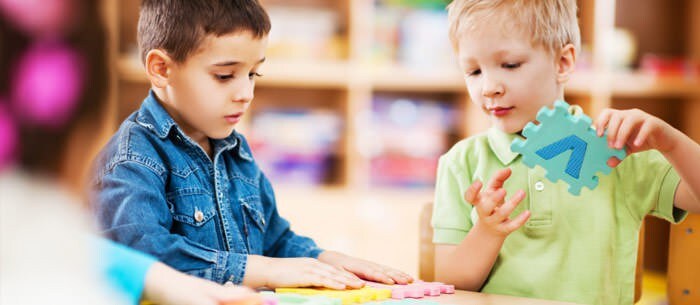
Michelle Duncan’s daughter, Nora, turns five in August, but Duncan’s not so sure she’ll be starting kindergarten in the fall. “I have been making myself crazy thinking about this, as I think it’s a huge decision with effects that can last for many years,” says Duncan, who lives in Santa Cruz, Calif.
Peer pressure is becoming a factor in the decision. Many of the other kids in Nora’s preschool class won’t be going onto kindergarten, even though they’ll turn five this summer. School administrators, responding to the trend, have advised Michelle that it’s okay to wait. Michelle’s younger son is also an August birthday, and she worries there will be even more pressure to hold him back because he’s a boy.
“It kind of makes me mad when I think that if I do send my kids on time, they will be with kids that could potentially be 16 months older,” says Duncan. “I think this is too much of an age difference at that young of any age.”
So, how do you know if your child is ready to start school? One of the best allies in making this decision is your child’s preschool teacher or a pediatrician, says Dr. Kyle Snow, director of the Center of Applied Research at the National Association for the Education of Young Children. The teacher should have the best idea of whether the child can meet social and academic expectations. Parents are not always the best judge of readiness, because they can be plagued by anxieties. Some parents worry that their child will get lost in a big classroom or will be seen as small and won’t get picked for sports teams. Others just want their kids to have the best possible start to school by learning and maturing more at home, or in a small Pre-K setting.
Do redshirted kids really have the advantage? Not necessarily, says Dr. Snow. He points to studies that show the benefits to redshirting disappear in the first half of elementary school. “By the time the child reaches third grade, they are doing the same as any third grader,” he states.
Dr. Robi Ludwig, Care.com’s parenting expert, says parents need to think about their child’s self-esteem when considering whether or not to delay starting kindergarten.
“You have to consider what will help my child feel successful and be successful,” she says.
Some children are late-bloomers and others suffer from attention disorders. She suggests consulting an expert if you have any doubts about school readiness.
“There are some kids where it just makes sense, says Dr. Ludwig. “They really do need an extra year to learn to process information. At the end of the day, what’s the big rush?”
The requirements and laws about starting kindergarten vary across the country, but local school districts often post their own kindergarten readiness requirements on their websites. Or you can call and ask the school secretary to send you the curriculum. So, it’s a good plan to check out requirements several months before deciding to enroll. There are no hard and fast rules about when a child is ready for kindergarten, but there are some common expectations.
Your child is probably ready to start Kindergarten if he or she:
-
Follows simple directions. Maybe you’re lucky and your little angel does whatever she’s told. But in reality, most children don’t behave all the time. It’s important, however, that your child can listen to a teacher and completes instructions.
-
Sits still. Your child shouldn’t be expected to sit for a three hour opera, but should remain in one spot long enough to listen to a story and participate in class activities.
-
Uses the restroom. Your child should be able to know when they have to go to the bathroom, and be able to manage it by themselves.
-
Recognizes some letters. Believe it or not, it’s OK if your child isn’t reading when they start school. But they should recognize some of letters of the alphabet.
-
Works on fine and gross motor skills. Your child should have some practice jumping and running, throwing a ball, and holding a pencil and scissors.
-
Gets along with peers. Ideally, your child knows how to share and take turns, but those are skills that can take a lifetime to master.
-
Handles emotions. It’s normal for a five year old to break down in tears when she’s upset. But, it’s important that she knows her feelings, and has coping strategies.
-
Shows an interest in learning. He doesn’t have to be a little Einstein, but it helps if your child listening to stories, music, and books and seems stimulated by the information.
The more excited a child is about school, the easier the transition will be.
If you decide your child is not yet ready for kindergarten, it’s important to come up with a game-plan for the year. Children who are behind socially or academically should get plenty of exposure to a classroom environment. It’s not much help to keep them at home, away from other kids and the chance to learn.
“I do think there are a myriad of advantages to spending at least a year in preschool or pre-K,” adds Dr. Snow.
Concerned parents also need to recognize the difference between meeting and exceeding expectations. Your child does not need to have mastered reading, writing and arithmetic before he or she starts school, but should show that he’s focused and stimulated by learning.
“There’s a difference between a child really being ready, and a child being more than ready,” says Dr. Snow. And if your child is ready, waiting until he’s older to start school may cause a bright kid to be so bored that he’ll slack off instead of excel in the classroom.
